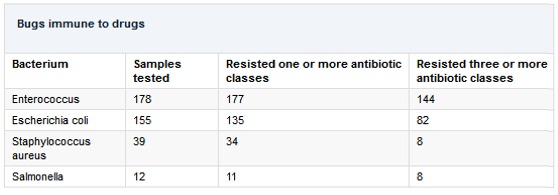Turkeys are taking revenge for the horrendous treatment by Agribusiness. Most ground turkey tested by Consumer Reports was contaminated with drug-resistant bacteria. But if you want to solve the problem, you’ll need to ignore their advice. There’s no solution within a system that treats food as nothing but a commodity.
by Heidi Stevenson
In a report that clearly documents modern Agribusiness’ utter lack of faith, Consumer Reports shows that the vast majority of ground turkey sold in the United States is contaminated with drug-resistant disease organisms, half with fecal bacteria.
The message is clear: Eat stuff that comes from Agribusiness at your own risk.
Consumer Reports blames the mass use of antibiotics to boost weight gain for the prevalence of antibiotic-resistant microbes in the 257 samples they tested. They found:
- 69% of samples were contaminated with Enterococcus and 60% with Escherichia coli (E. coli), both of which are found in the gut, so are fecal bacteria.
- 80% of Enterococcus and more than half the E. coli samples were resistant to 3 or more classes of antibiotics.
- MRSA (methicillin-resistant Staphylococcus aureus) was found in 3 samples. MRSA is the flesh-eating bacteria.
- Ground turkey labeled with “no antibiotics”, “organic”, or “raised without antibiotics” was just as likely to be contaminated, though the bacteria were less likely to be drug-resistant. That leads to questions about what’s really meant by these terms in the pressure-cooker world of “organic” Agribusiness.
Here is Consumer Reports’ table of how often they found drug-resistant bugs:

Unfortunately, Consumer Reports’ suggestions are less than ideal. They suggest:
- Buy turkey meat labeled as organic—in spite of the fact that the term clearly has limited meaning in today’s supermarkets.
- Consider alternative labels, such as “animal welfare approved” and “certified humane”. This, though, does not resolve the real issue: Agribusiness. The bottom line is that you are not going to find truly healthy food of any sort in supermarkets.
- Be aware that the term “natural” holds little meaning, merely that processing is limited and it contains no added color or artificial ingredients. “Natural” does not mean organic. Of course, as should be obvious from Consumer Reports’ results, “organic” doesn’t really mean organic in supermarkets.
- Be aware that no type of meat is risk-free. That’s true—but surely these results demonstrate that the basic nature of the Agribusiness food system is inherently flawed!
- Buy meat right before checking out and place it in a plastic bag without leaks. This isn’t a solution. It’s merely a means of limiting the damage and keeping it from contaminating other foods.
- Store meat at 40° F or lower if it’s to be kept less than 2 days before use. Otherwise, freeze it. Again, this is simply a means of limiting damage.
- Cook ground turkey to at least 165° F inner temperature. This is now becoming the rule you’re supposed to follow for all meat. Cook beef to a fare-thee-well, so it loses most of its flavor and nutritional value. Cook everything to a crisp, just to make sure that you don’t contract a deadly disease. After all, we clearly cannot expect Agribusiness to change its ways!
- Wash your hands and all surfaces after handling ground turkey.
- Don’t return cooked meat to a plate that held it raw.
Basically, it sounds like Consumer Reports is suggesting that you accept Agribusiness’ contaminated meat as your only option. But there is a better way, though it does take time and effort. If you possibly can, you should purchase meat—or food of any kind—directly from the farmer. You should know how it’s raised and processed.
The reality is that the convenience brought to us by Agribusiness is stealing our health and killing us. We’ve become fearful of genuine nourishment from healthy raw or fresh foods with soil attached. We’ve forgotten where food comes from. Real food isn’t sold in supermarkets. Real food is not produced under an ethos of increased scale of production. Real food is not a discount product. And any suggestion that supermarkets save us money is laughable once environmental destruction, pollution, and the costs of chronic disease are factored in.
We’ve lost our way if we can look at Consumer Reports’ suggestions of how to protect yourself against Agribusiness’ contaminated products and believe that it’s even close to a solution!
This means, of course, that you must step outside the Agribusiness system. But isn’t your health—and that of your family—worth it?
Source:
